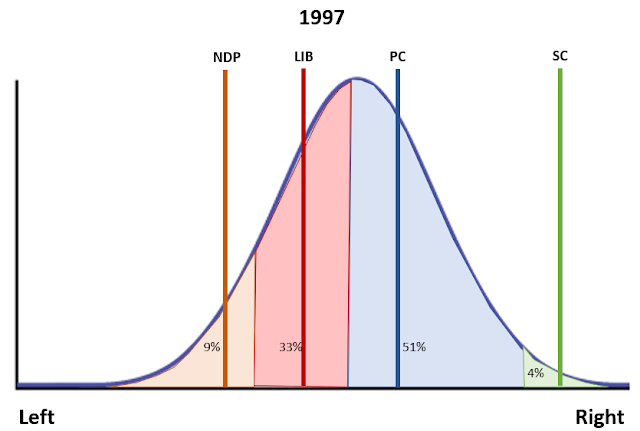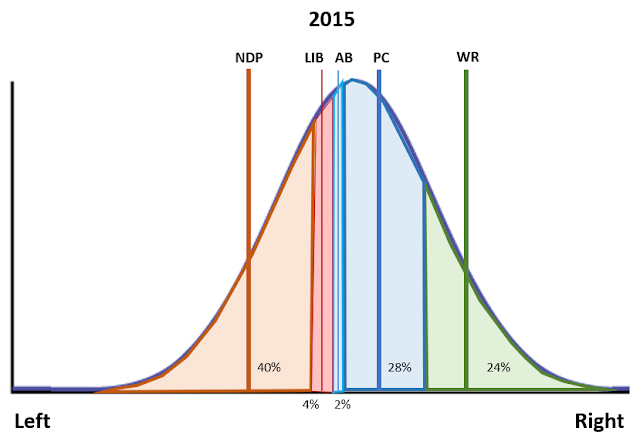The Day After
Now that the 2019 Alberta Election is complete I thought I'd take this chance to analyze the results and put them in a historical context. Against that historical backdrop, the result yesterday is exactly what you'd expect given the landscape today and probably gives us some idea of what's going to happen going forward. So to do that let's start 33 years ago in 1986.1986
In the 1986 election there were 4 effective parties in Alberta: The PCs, NDP, Liberals and a right wing party called Representative. Representative wasn't able to capture much support though and the PCs won 51% of the vote, the NDP won 29%, and the Liberals managed 12%. This is a pretty typical election for Alberta.1989
After the dismal showing in 1986 for the Representative party it effectively folded leaving the entire right side of the spectrum for the PC party. That said, Don Getty wasn't a particularly effective party leader (he would even lose his own seat in this election) and gave up some of the middle ground to the Liberals.1993
In 1993 the Liberals managed to consolidate most of the left wing vote (pushing the NDP into obscurity for more than a decade) and kept much of the center ground ceded by Getty after bring in Laurence Decore as leader. Getty would actually resign in advance of this election leaving Ralph Klein to take over the party only 7 months before the election. Without any significant split on the right however he managed to hold just enough support to win.1997
Now running as the incumbent in 1997 Ralph Klein managed to gain back the center vote Getty lost and returns the PC party back to its roughly typical share of the vote. We also see the re-emergence of a far right wing party Social Credit although their poor showing in this election will discourage another try.2001
With Social Credit now ineffective and Alberta First not even able to run a full slate of candidates the entire right side of the spectrum effectively became PC voters. With much of the public spending cuts also completed and the economy in Alberta doing well the PCs also managed a perceived shift towards the center resulting in their biggest electoral victory since Lougheed.2004
As typically happens when the PCs get too successful and move towards the center of the spectrum the 2004 election featured a new contending party on the right side of the spectrum, the Alberta Alliance. This time however the party capitalizes on the branding of a federal conservative party and does manage to pick up a significant chunk of the vote.2008
This is where things get a little problematic for the PCs. Instead of fending off the new emerging party on their flank they instead seek more votes by moving even closer to the center. The new party leader, Ed Stelmach, even holds a royalty review promising to ensure Alberta gets its 'fair share' of oil and gas development. In the near term it works as the lost votes from the right are more than made up for by gains from the Alberta Liberals but it's the beginning of the end for the PC party.2012
In 2012 the Wildrose party really emerges as a serious contender on the right side of the political spectrum as the new PC leader, Alison Redford, keeps the PCs near the center. However, in what ends up being the strangest election in the province's history Redford manages to win the election as an incredible number of Liberal supporters strategically vote for her in order to avoid a Wildrose victory.2015
The consequence of the 2012 election is that the PCs and Wildrose don't realize how significant the vote splitting between their two parties is and despite a near merger they do not in fact merge prior to the election. Also, after voting strategically in 2012 typical Liberal supporters are looking for someone new to support and are more open than ever before to a charismatic new leader of the NDP, Rachel Notley. Of course we all know now that the ultimate result is a near perfect split of the vote on the right and near consolidation of the vote on the left under the NDP which means the first change in government for Alberta in over 40 years.2019
Although I was skeptical that the parties would figure it out the PCs and Wildrose do manage to merge prior to the 2019 election. Their new leader, Jason Kenney, effectively navigates that merger and puts the new UCP right back where the old PC party used to be on the spectrum and unsurprisingly the formula works. The vote on the left was still quite consolidated under the NDP but very similar to 1997 and 2001 there are just more right wing voters than left in Alberta resulting in a UCP victory.Predictions for 2023
On the left side of the spectrum I don't anticipate much change for 2023. The Alberta Party has effectively taken over for the Alberta Liberal party but unless they can convince current NDP supporters that they have a better shot at forming government I don't see the vote on the left changing much. The right side of the spectrum will depend a lot on how Jason Kenney positions the party. If he moves it closer to the center I believe you will see another far right party pop up and take a decent chunk of the vote (5 - 10%) but unless there are incredible problems the UCP will almost certainly form government again in 2023.Beyond 2023
If the UCP forms government in 2023 I think you will see the left split again. Right now I believe the NDP's support is largely dependent on the premise that they are the best chance to beat the UCP. If they fail to do that two elections in a row however I predict that some of their support will move to its more natural position with a centrist party like the Alberta Party and things will look more like 1989.On the right side of the spectrum it all comes down to the UCP's positioning. If they stay center right and respond properly to a new threat on their flank they can continue to govern indefinitely. If they take the 2008 approach however and move to the center it will again end in a split of the right. Over the next 8 years I also think that the threat from the right won't be a social conservative movement. Depending on how Alberta's economy does and how relations change with the rest of Canada I strongly suspect that the next serious far right party will be a separation party.










Comments
Post a Comment